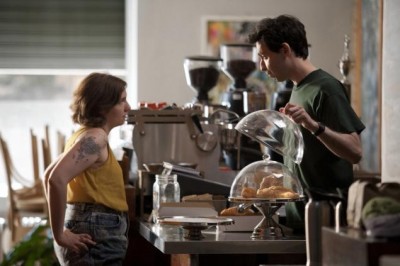Millennial Fired For Tweet
by Brendan O’Connor

Until last week, I worked at a food truck downtown. We sold grilled cheese and milkshakes. One of the unusual things about this particular food service job was that the owner used customer comments and pictures on social media — especially Twitter and Instagram — to monitor his workers. Grilled cheese: gamified.
And it was explicitly framed as a game for workers. Members of whichever ‘crew’ got the most positive feedback on social media each month would win a $25 iTunes gift card.
But compliments are hard to track online. Even if a customer thinks she is paying a compliment online, she might not be. Like if you enjoyed your sandwich enough to Instagram it, but the color of the grilled bread wasn’t exactly right, we’d hear about it.
Anyway. The other rainy Monday morning, business was slow when a group of about a dozen customers sprinted up. This was at our second location, a stall the company opened in South Street Seaport to support the area while Hurricane Sandy repairs were happening. This group placed a huge order: three of this sandwich, four of another, three of the one that takes forever on the grill, two of the one that takes forever to assemble. Five or six milkshakes. The order came to just under $170.
I was making sandwiches, another worker took the order and a third made the milkshakes and watched the grills. A line grew while we worked, and we had to tell other customers that their lunch orders would take longer than usual. They paid; I asked my co-worker who was dealing with the money how much of a tip they’d left. They had left actually no tip at all. (They had paid with a card so we checked the cash tips to see if there’d been a bump. There hadn’t.)
I asked some of the group as they were picking up their orders if they had intended to not tip. They hemmed and hawed and walked away.
Well. I could have not said anything. I could have made it a subtweet. I probably should have made it a subtweet. But I didn’t, because of some misguided notions about having “the courage of your convictions,” or whatever.
Shout out to the good people of Glass, Lewis & Co. for placing a $170 order and not leaving a tip. @glasslewis
— Brendan O’Connor (@OConnorB_) July 22, 2013
Two days later, I got a text from the owner asking if I was free to talk on the phone at some point. We spoke later that afternoon.
He told me that he’d gotten a call from the company, Glass, Lewis & Co. The company provides shareholder advisory services. Apparently, those employees were mortified that their lunch truck had tip-shamed them — the home office in San Francisco even got involved.
And it was unfortunate but he was going to have to let me go. The company has a way of doing things and he thought I’d understood that. I had embarrassed him and the company and that was that.
The food truck apologized to the customers on Twitter, and Glass, Lewis accepted that apology.
@milktrucknyc We appreciate it, and look forward to doing business with you again!
— Glass Lewis & Co. (@GlassLewis) July 24, 2013
Obviously I knew it was a possibility that I’d get fired. I guess I had hoped that the owner would have my back if they complained, but that was a miscalculation. And the stakes weren’t too high, or I wouldn’t have done it: I’d been thinking about quitting and focussing on freelancing, so I had a luxury of speaking, and then tweeting, my mind.
What did I get out of this? Hmm. A “story,” maybe. A lesson about employers — at least in the food service industry — and what they think of workers advocating for themselves.
To be fair, maybe I’m not the best employee for a gamified grilled cheese truck. About a month earlier, I’d come into work on a Saturday and was told I’d need to work late the next day. (Our schedules are established on a weekly basis, so this was very late notice.) I believed this gave me some degree of leverage. So I started bargaining. If they needed me to stay late on Sunday with only 24 hours notice, surely it was only fair that they let me go early that night?
They weren’t too happy about this and my bargaining failed — they just found someone else to work late on Sunday. I suppose this is why ‘collective bargaining’ is a thing.
The justice or injustice of tipping is a question again under hot debate; the incivility of failing to leave a tip on an order of that size, in the current arrangement of things, is not. There is a reason so many restaurants impose a mandatory tip on parties of a certain size.
And also: If social media is going to be used in one way to monitor worker productivity, why can it not also be used to advocate for a more civil exchange between worker and consumer? And why wouldn’t a food service entity, while it’s judging employees on social media, also judge its customers? The business practice of running a restaurant is to cultivate great customers and spurn bad ones.
At least I wasn’t asked to delete the tweet. And I wasn’t asked to apologize. Not that I would have done either of those things. I was just canned. A part-time food-truck worker with 300 Twitter followers managed to shame some Wall Street firm into getting him fired. What a world.
